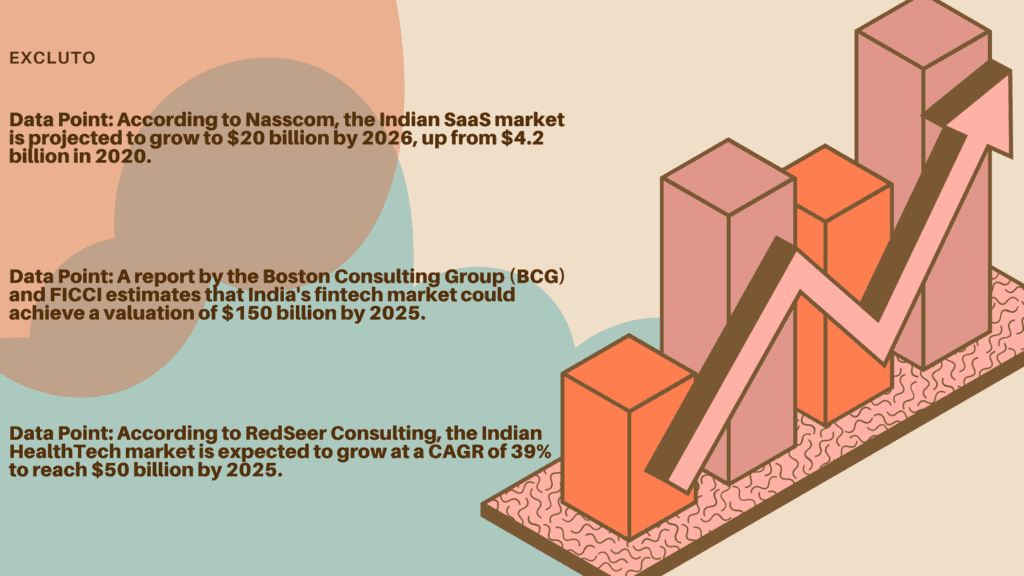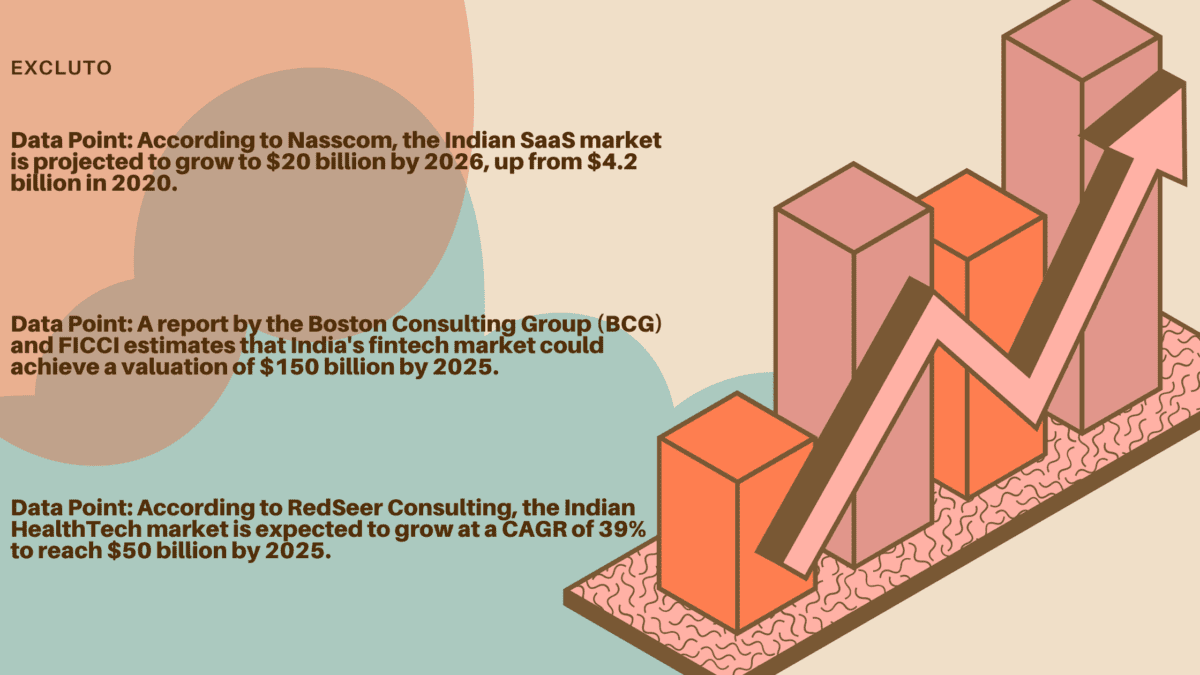India’s startup ecosystem has become one of the most vibrant and dynamic in the world. With a young, tech-savvy population and increasing support from both government and private investors, the Indian startup landscape is thriving.

As we step into 2024, certain sectors are poised for remarkable growth, presenting significant opportunities for venture capitalists (VCs) and investors. This blog delves into the key sectors driving this growth and highlights the opportunities they offer, supported by recent data and case studies.
Key Sectors Driving Growth
1. Technology and SaaS
India’s technology sector continues to be a powerhouse, with Software as a Service (SaaS) emerging as a critical area of growth. The country’s IT expertise and cost-effective solutions have positioned it as a global hub for SaaS development.
Data Point: According to Nasscom, the Indian SaaS market is projected to grow to $20 billion by 2026, up from $4.2 billion in 2020.
Source: Nasscom.
2. Fintech
Fintech remains one of the most dynamic sectors in the Indian startup ecosystem. With the rapid digitalization of financial services and increasing smartphone penetration, fintech startups are revolutionizing how Indians manage their finances.
Data Point: A report by the Boston Consulting Group (BCG) and FICCI estimates that India’s fintech market could achieve a valuation of $150 billion by 2025.
Source: BCG and FICCI.
Case Study: Razorpay, a leading fintech startup, has shown significant growth since its inception. The company recently achieved unicorn status and continues to expand its suite of financial services, including payment gateways, neo-banking, and lending solutions.
3. HealthTech
The COVID-19 pandemic accelerated the adoption of digital health solutions, making HealthTech a crucial sector in India’s startup ecosystem. Innovations in telemedicine, health diagnostics, and health management systems are transforming the healthcare landscape.
Data Point: According to RedSeer Consulting, the Indian HealthTech market is expected to grow at a CAGR of 39% to reach $50 billion by 2025.
Source: RedSeer Consulting.
Case Study: Practo, an Indian HealthTech startup, has revolutionized the healthcare sector with its comprehensive digital health platform. Offering services from online doctor consultations to medicine deliveries, Practo has become a household name.
Source: Practo.
4. E-commerce
E-commerce continues to flourish in India, driven by increasing internet penetration and changing consumer behaviors. The rise of direct-to-consumer (D2C) brands and the expansion of online marketplaces are key drivers of this growth.
Data Point: According to a report by IBEF, India’s e-commerce market is expected to grow to $200 billion by 2026, up from $50 billion in 2020.
Source: IBEF.
Case Study: Nykaa, an e-commerce platform specializing in beauty and wellness products, went public in 2021 and achieved a market capitalization of over $14 billion. Nykaa’s success exemplifies the growth potential in the e-commerce sector.
5. EdTech
The EdTech sector in India has witnessed exponential growth, particularly in the wake of the COVID-19 pandemic. Online learning platforms and digital education tools have become essential for students and educators alike.
Data Point: According to a report by RBSA Advisors, the Indian EdTech market is projected to reach $30 billion by 2030.
Source: RBSA Advisors.
Case Study: BYJU’S, the world’s most valuable EdTech startup, continues to expand its global footprint. With a valuation of $22 billion, BYJU’S offers a wide range of learning solutions, from K-12 education to competitive exam preparation.
Opportunities for VCs and Investors in the World of Startup
The Indian startup ecosystem offers numerous opportunities for VCs and investors looking to capitalize on high-growth sectors. Here are some key considerations:
1. Early-Stage Investments: Investing in early-stage startups allows for significant returns as these companies grow and scale. Identifying promising startups in burgeoning sectors like HealthTech and EdTech can be particularly lucrative.
2. Strategic Partnerships: Collaborating with established companies can provide startups with the resources and expertise needed to scale rapidly. Investors can play a pivotal role in facilitating these partnerships.
3. Impact Investing: Many startups in India are focused on solving social and environmental challenges. Impact investing in sectors like HealthTech and EdTech not only offers financial returns but also contributes to positive societal impact.
4. Geographic Diversification: While major cities like Bangalore, Mumbai, and Delhi-NCR are startup hubs, tier 2 and tier 3 cities are emerging as new centers of innovation. Diversifying investments geographically can uncover hidden gems.
Conclusion
The Indian startup ecosystem is a hotbed of innovation and growth, with key sectors like technology, fintech, HealthTech, e-commerce, and EdTech leading the charge. As we move further into 2024, the opportunities for VCs and investors are immense. By strategically investing in these high-growth sectors, one can capitalize on the robust growth and innovation driving India’s economic future.
At Excluto, we are dedicated to bridging the gap between venture capitalists and investors. Our platform provides a seamless and transparent environment for exploring venture capital as an asset class.
By leveraging Excluto, users can access curated investment opportunities, expert insights, and a network of like-minded investors, facilitating a robust and diversified investment strategy.
Read More About Startup World
Monthly Indian Startup Funding Roundup- July 2024
India’s $45 Billion Startup Implosion Puts Tech Future in Doubt

